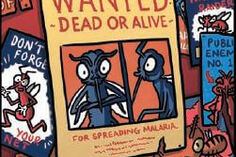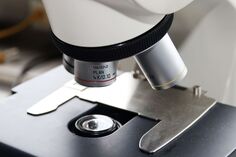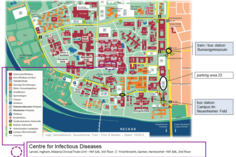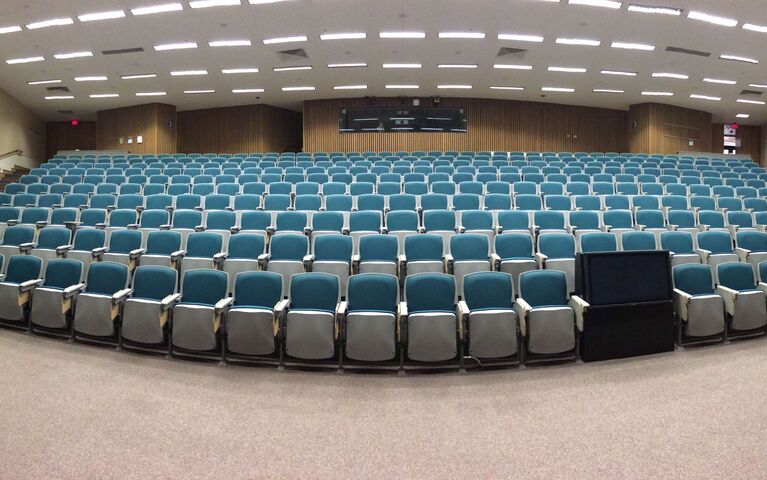2022
| (Ab dem 30. Mai fand das Seminar größtenteils wieder am letzten Montag eines Monats um 12:00 oder 17:00 Uhr mitteleuropäischer Zeit in SR 003/004 (INF 344, EG) statt, mit der Möglichkeit einer online Teilnahme über Webex). | |||
| Datum | Gastredner | Heimateinrichtung | Vortragstitel |
| 28.11.22 | Nicolas Brancucci | Swiss TPH, Schweiz | Intra-erythrocytic Plasmodium falciparum:host interactions |
| 24.10.22 | Hilary Ranson | Liverpool School of Tropical Medicine, Großbritannien | Using entomological data to estimate public health value of new malaria intervention tools |
| 26.09.22 | Diana Moita | Institute of Molecular Medicine, Lissabon, Portugal | Whole-sporozoite vaccines against malaria: How different can they be? |
| 23.09.22 | Netsanet Mengitsu | University of Gondar, Äthiopien | Neurolathyrism: An Incurable Disabling Neurological Disorder of The Neglected Communities in Ethiopia and Beyond |
| 02.09.22 | Moussa Guelbeogo & Antoine Sanou | Centre National de Recherche et de Formation sur le Paludisme, Burkina Faso | presentation of current research |
| 27.06.22 | Rolf Fendel | Universitätsklinikum Tübingen | Immune response to malaria vaccines |
| 30.05.22 | Norbert Becker | European Mosquito Control Association (EMCA) | The control of mosquitoes as nuisance and vectors in Germany and the potential of technology transfers to tropical countries |
| 25.04.22 | Rhoel Dinglasan | Emerging Pathogens Institute, University of Florida, USA | Malaria Transmission-Biology: From host-pathogen interactions to vaccines and diagnostics but not necessarily in that order |
| 28.03.22 | Paul Sigala | University of Utah, USA | Unraveling the Metabolic Adaptations of Malaria Parasite |
| 28.02.22 | Cheryl Andisi Kivisi | Pwani University, Kenia | Plasmodium surface antigen presentation |
| 31.01.22 | Ian Cheeseman | Texas Biomedical Institute, San Antonio, USA | Rapid Adaptation in Malaria Parasites’ |
2021
| (Ab 2021 organisiert von unserer AG-Leiterin Victoria Ingham. Aufgrund von COVID-19 fand das Seminar online statt, meist am letzten Montag eines Monats um 12:00 oder 17:00 Uhr mitteleuropäischer Zeit). | |||
| Datum | Gastredner | Heimateinrichtung | Vortragstitel |
| 06.12.21 | Lilach Sheiner | University of Glasgow, Großbritannien | Mitochondrial enzymes in Toxoplasma - a complex story! |
| 25.10.21 | Marcel Deponte | Technische Universität Kaiserslautern | Protein abundance and folding rather than the redox state of Kelch13 determine the artemisinin susceptibility of Plasmodium falciparum |
| 30.08.21 | Jacob Tennessen | The Broad Institute / Harvard, USA | Population genomics and impacts on parasite evolution and transmission |
| 26.07.21 | Selina Bopp | Harvard TH Chan School of Public Health, USA | A natural variant in Plasmodium falciparum Acyl Co-A Synthetase 10 confers resistance to novel antimalarials |
| 28.06.21 | Antoine Sanou | Centre National de Recherche et de Formation sur le Paludisme (CNRFP), Burkina Faso | Malaria vector control in Burkina Faso: what are the challenges? |
| 08.06.21 | Joachim Matz | The Francis Crick Institute, London, Großbritannien | Mechanisms of heme biomineralisation in the malaria parasite |
| 31.05.21 | Sunil Parikh | Yale University, USA | Ivermectin to reduce malaria transmission in Burkina Faso - early results from a cluster-randomized trial |
| 26.04.21 | Robyn Kent | University of Vermont, USA | The stage specific roles of motility in T. Gondii’ |
| 06.04.21 | Carola Schäfer | Bernhard-Nocht-Institut, Hamburg | A humanised mouse model to test antibody-based interventions against relapsing malaria |
| 22.02.21 | Flaminia Catteruccia | Harvard TH Chan School of Public Health, USA | Breaking up Anopheles-Plasmodium interactions for malaria elimination |
| 25.01.21 | David Pigott | Institute of Health Metrics and Evaluation, University of Washington, USA | Data for Modelling COVID-19 and implications for data on Global Health Security |
2020
| (Wiederaufnahme der Seminarreihe am 7. September 2020. Aufgrund von COVID-19 wurde das Seminar virtuell abgehalten). | |||
| Datum | Gastredner | Heimateinrichtung | Vortragstitel |
| 14.12.20 | Elizabeth Egan | Stanford University School of Medicine, USA | Deciphering the role of the red cell in Plasmodium falciparum malaria |
| 08.12.20 | Sunil Parikh | School of Public Health, Yale University, USA | Optimizing artemisinin-combination therapies to maximize efficacy and limit resistance |
| 01.12.20 | Matthias Garten | National Institutes of Health, Bethesda, USA | Segregation of function at the host-red blood cell – malaria parasite interface: protein, solute and lipid transporters in domains at contact sites |
| 16.11.20 | Chris Moxon | Wellcome Centre for Integrative Parasitology, University of Glasgow, Großbritannien | How might we put the breaks on blood brain barrier breakdown in cerebral malaria |
| 03.11.20 | Silvia Kariuki | KEMRI Wellcome Trust Research Programme, Kilifi, Kenia | Mechanism of protection against severe malaria conferred by the Dantu blood group variant |
| 19.10.20 | Muhammad Asghar | Karolinska Institute, Stockholm, Schweden | Long-term hidden cost of infections |
| 06.10.20 | Victoria Ingham | Liverpool School of Tropical Medicine, Großbritannien | The complexity of insecticide resistance in Anopheline vectors |
| 21.09.20 | Marta Maia | KEMRI Wellcome Trust Research Programme, Kilifi, Kenia | Near infrared spectroscopy for sporozoite detection in mosquitoes |
| 07.09.20 | Tovi Lehmann | National Institute of Allergy and Infectious Diseases, Rockville, USA | A high, mosquito eye view on malaria and the African mosquito-borne diseasome |
| Unterbrechung der Seminarreihe von März bis August 2020 aufgrund sozialer Distanzierungsvorschriften im Zusammenhang mit COVID-19. Wiederaufnahme des Seminars im September über die Webinar-Plattform Zoom. | |||
| 14.02.20 | Michaela Petter | Universitätsklinikum Erlangen | The epigenome of Plasmodium falciparum gametocytes |
2019
| Datum | Gastredner | Heimateinrichtung | Vortragstitel |
| 12.12.19 | Melissa Penny | Swiss Tropical & Public Health Institute, Basel, Schweiz | Development and deployment of novel malaria interventions: the role of modelling and simulation |
| 29.11.19 | Miguel Soares | Instituto Gulbenkian de Ciência, Oeiras, Portugal | Metabolic adaptation as a defense strategy against infection |
| 14.11.19 | Amulic Borko | School of Cellular and Molecular Medicine, University of Bristol, Großbritannien | Neutrophil regulation of Plasmodium sequestration and immunopathology |
| 17.10.19 | Alfred Cortés | iSGlobal, Barcelona, Spanien | Sexual conversion in malaria parasites: the epigenetic mark, the transcription factor and the target genes |
| 10.10.19 | Catherine Merrick | University of Cambridge, Großbritannien | The many cycles of Plasmodium falciparum: DNA replication & cell cycling in an unusual protozoan |
| 12.09.19 | Thomas Otto | University of Glasgow, Großbritannien | Computational approaches to study the evolution of var genes in Plasmodium |
| 30.08.19 | Carolina Barillas Mury | National Institute of Allergy and Infectious Diseases, Rockville, USA | Plasmodium evasion of mosquito immunity enhances malaria transmission |
| 13.06.19 | Matthias Marti | University of Glasgow, Großbritannien | Revisiting malaria transmission: from biology to translation |
| 06.06.19 | Joana Carneiro da Silva | Institute for Genome Sciences, University of Maryland School of Medicine, USA | Genomics of whole organism vaccine-induced protection |
| 09.05.19 | Rogerio Amino | Institut Pasteur, Paris, Frankreich | Protective cytotoxic antibodies target malaria parasites in the host skin |
| 11.04.19 | Hedda Wardemann | Deutsches Krebsforschungszentrum, Heidelberg | Human B cell memory to Plasmodium falciparum Circumsporozoite Protein |
| 21.03.19 | Ayola Akim Adegnika | Centre de Recherches Médicales de Lambaréné, Gabun | Fast track development of malaria vaccine in malaria endemic area using CHMI in Lambarene, Gabon |
| 14.03.19 | Maryse Lebrun | University of Montpellier, Frankreich | Insights into the secretion machine of virulence factors in apicomplexan parasites |
| 28.02.19 | Marcel Deponte | Universität Kaiserslautern | The oxidative stress hypothesis in malaria research: facts and fiction |
| 14.02.19 | Moritz Treeck | The Crick Institute, London, Großbritannien | Species-specific virulence factors in human Malaria: Expansion and export of a kinase family in Plasmodium falciparum |
| 10.01.19 | Mathieu Brochet | University of Geneva, Schweiz | Taking life changing decisions in ten seconds - calcium signalling in malaria parasites |
2018
| Datum | Gastredner | Heimateinrichtung | Vortragstitel |
| 13.12.18 | Sam Wassmer | LSHTM, Großbritannien | Linking sequestration, vascular dysfunction, and brain swelling in cerebral malaria |
| 08.11.18 | Marcelo Urbano Ferreira | Institute of Biomedical Sciences, University of São Paulo, Brasilien | Naturally acquired antibodies and clinical immunity to Plasmodium vivax malaria |
| 11.10.18 | Catherine Lavazec | Institut Cochin, Paris, Frankreich | Targeting erythrocyte mechanical properties to block malaria parasite transmission |
| 13.09.18 | Erica Pasini | Biomedical Primate Research Center, Niederlande | Non-human primates in malaria research - Using ‘omics to study parasite-host interactions |
| 09.05.18 | Miguel Prudencio | Instituto de Medicina Molecular, Lisbon, Portugal | Pre-Clinical and Early Clinical Evaluation of a Plasmodium berghei Sporozoite-Based Malaria Vaccine |
| 12.04.18 | Stéphanie Blandin | Strasbourg University, Frankreich | |
| 08.02.18 | Elena Levashina | Max-Planck Institut, Berlin | Dynamics of malaria infections in Anopheles mosquitoes |
| 11.01.18 | Laurent Dembele | Bamako University, Mali | Relapsing Malaria Liver Stage Model Enabling Novel Drug Discovery Against Hypnozoite |
2017
| (Start der DZIF-Seminarreihe im Oktober 2017, organisiert von unserer AG-Leiterin Silvia Portugal). | |||
| Datum | Gastredner | Heimateinrichtung | Vortragstitel |
| 14.12.17 | Steffen Borrmann | University Tübingen | Malaria - still more questions than answers |
| 05.10.17 | Miles Davenport | Kirby Institute for Infection and Immunity, UNSW Sydney, Australien | Host-pathogen interactions in malaria |





